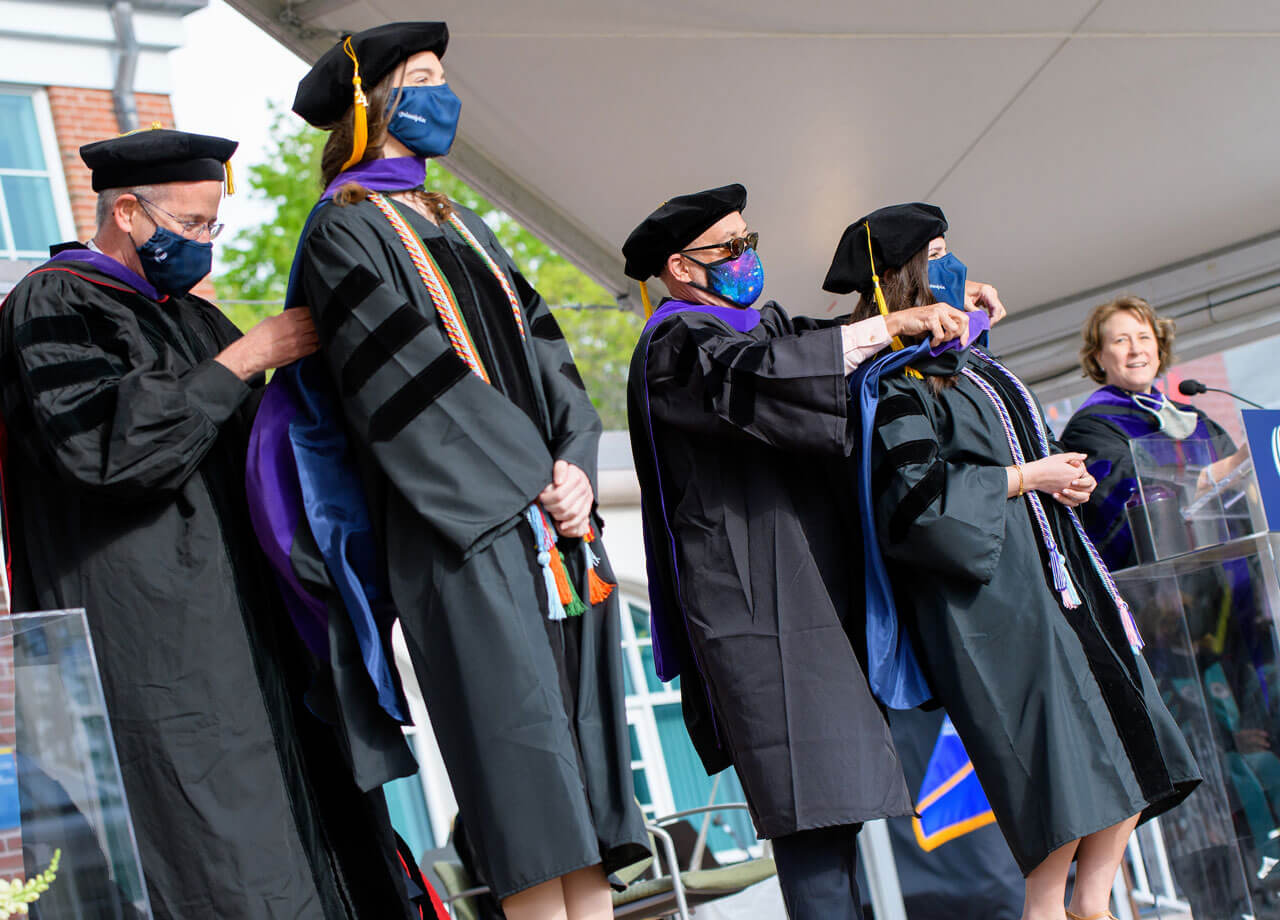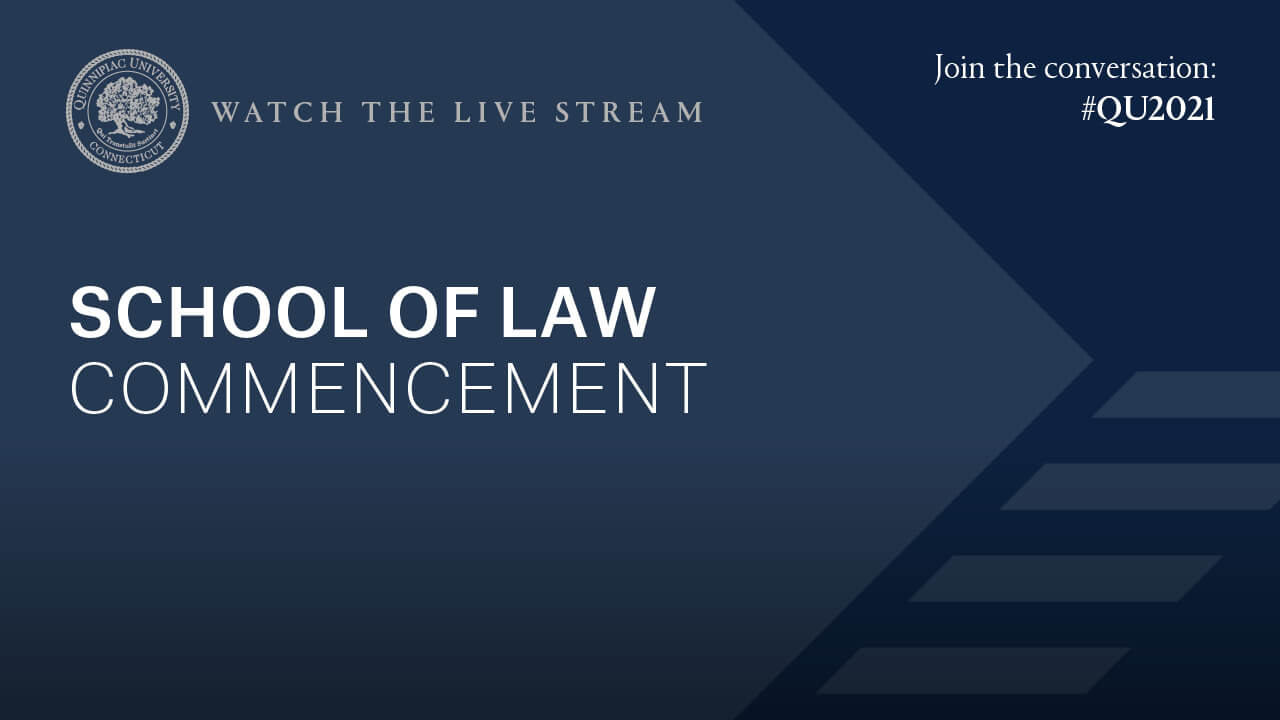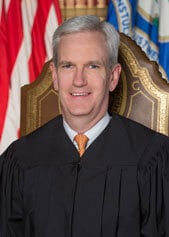
Class of 2021 School of Law Commencement


Justice Andrew McDonald, of the Connecticut Supreme Court, told the Class of 2021 to think about how they want their careers to be written Tuesday at the Commencement exercises for the School of Law.
“What is the rest of your story? You likely do not yet fully know the answer because it will continue to unfold in front of you every day of your life,” McDonald said. “But the story of your professional career will not be left up to chance,” he added. “No, instead it will be written by the choices you make, the opportunities you seize, the doors you open and the doors you close.”
For McDonald, the door to marriage equality that opened for him and his partner in 2009 came as a result of the tireless advocacy of lawyers and legal scholars.
“I have no doubt that the walls we knocked down in Connecticut are the direct consequence of the hard work, creativity and bravery of the lawyers and law professors who were on the front lines of that effort,” McDonald said. “Perhaps chief among them were your own dean, Jennifer Brown, and her husband Ian Ayres.”
In all, 102 graduates earned their juris doctors Tuesday on the Mount Carmel Campus Quad.
As she looked out from the lectern, President Judy Olian saw a class of graduates ready to uplift society and right wrongs.
“I see a class of legal professionals who have the skills and voice to alleviate social injustice, address racial inequality, and right the persistent divides in so many areas of our society,” Olian said. “Thank you for your work that I know will continue as you launch your journey as legal professionals and advocates on behalf of justice.”
School of Law Dean Jennifer Gerarda Brown pointed out the gift bags under each graduate’s chair. Inside, notes from the School of Law faculty were written on paper with seeds embedded in it.
“I hope you’ll give yourself a moment to think about that,” Brown said. “Those pieces of paper contain the future life that I hope your education will give you.”
“Just as I hope you will plant those pieces of paper in soil and see what comes,” Brown added, “I hope you will also be ready and energetic and excited to plant the seeds of your knowledge, your skills, your values gained at Quinnipiac Law School.”
Alexander Puzone, JD ’21, sang the national anthem at the ceremony. George Morgan Jr., JD ’21, the Student Bar Association president, delivered the student remarks for the class.
“The whole lawyers we were educated to be are advocates who remember their roots, while also focusing on what lies ahead,” Morgan said. “We were trained to be lawyers who never forget the public good.”
It is precisely that prescriptive that begins those stories that McDonald addressed at the start of his remarks.
“Whatever you choose to do with the law degree bestowed upon you today, uphold the highest ideals and the honor of this proud profession,” McDonald said. “Those who cannot afford legal representation need you, too. Don't forget about them.”
“You will never be so honored to be a lawyer as when you represent someone in their most dire moments who cannot afford your services,” he added. “It is the greatest gift you can give them and, I would argue, it is the greatest give you can give to yourself.”
Learn more about the School of Law

Processional
Pomp and Circumstance, Sir Edward Elgar
Call to Commencement
Debra J. Liebowitz
Provost
National Anthem
Alexander Puzone, JD ‘21
Greetings
Judy D. Olian
President
Conferral of Honorary Degree
Judy D. Olian
Debra J. Liebowitz
Justice Andrew McDonald Connecticut Supreme Court
Citation: Angela Robinson
Waring and Carmen Partridge Faculty Fellow
Commencement Address
Justice Andrew McDonald
Administration of the Oath of Professionalism
Professor of the Year, Jennifer B. Levine
Assistant Professor of Law
Presentation of Candidates for Degrees and Awards
Jennifer Gerarda Brown
Dean of the School of Law
Hooders:
Neal R. Feigenson, Professor of Law
W. John Thomas, Professor of Law
Conferral of Degrees
Judy D. Olian
Remarks
George Morgan Jr., JD ‘21, Student Bar Association President
Recessional

Senior Associate Justice
Connecticut Supreme Court
Andrew J. McDonald is the senior associate justice of the Connecticut Supreme Court, lawyer and former state senator. He has ruled on some of highest profile court cases in Connecticut’s history and served the state’s legislative, judicial and executive branches for nearly three decades. A native of Stamford, McDonald graduated from Cornell University and received his JD, with honors, from the University of Connecticut School of Law. He was a litigation partner at Hartford-based law firm, Pullman & Comley, LLC, from 1991 to 2011. McDonald began his public service career with the Stamford Board of Representatives, on which he served from 1993-95. He served the city of Stamford in numerous other capacities, including as director of legal affairs and corporation counsel from 1999-02, before being elected to the senate in 2003 as a Democrat. McDonald chaired the Senate Judiciary Committee for the entirety of his legislative tenure, and was deputy majority leader from 2005-11. He left the senate in 2011 for the position of chief legal advisor to Gov. Dannel P. Malloy. In this role, he provided legal counsel and analysis on all aspects of executive branch functions and operations. He was confirmed to the Supreme Court in 2013 and re-confirmed by the Lamont administration in 2021. McDonald resides in Hartford with his husband, Charles.
The 12th and 13th centuries saw the formation of universities under the jurisdiction of the Church. Most students of the day were clerks in the Holy Order, monks or priests. Cowls or hoods adorned their habits and protected the young scholars from harsh weather and the pervading dampness of the stone buildings in which they studied. Hoods also served to cover tonsured heads before the use of the skullcap.
Today, the cap, gown and hood have taken on a symbolic meaning. Color and shape conform to an academic code signifying a university’s conferral of the degree and the nature of the degree conferred. Gowns for the doctoral degree carry velvet panels and three horizontal velvet bars on the upper arm of the full, round, bell-shaped sleeves.
The mace — a symbol of authority — has antecedents in both Roman and Medieval history. The Roman mace (fasces) was carried by a lictor before the chief magistrate of the city, as well as before the legions. During the Middle Ages, the mace (mateola), a weapon of war, became first a symbol of victory and then a symbol of authority. The mace emblazoned with the Great Seal of England became a symbol of authority in Parliament by the end of the 13th century. It is this form of the mace that was the prototype of those symbols of authority, not only of legislative bodies, but also of cities and universities.
In 1246, following some 20 years of strife, the University of Paris was finally conceded the right to its own common seal. Since then, the use of the seal engraved on the mace has come to symbolize the authority of the academic community. In July 2000, Quinnipiac commissioned the noted sculptor Robert Meyer of Westport, Connecticut, to design and execute a new mace for Quinnipiac University. Cast in bronze, the mace incorporates elements of the university seal.
The medallion (medal of office), like the mace and the seal, is also a symbol of authority. It is possible that its roots may be traced back to the Roman “bulla” (a gold amulet of honor). The obverse of the medallion shows the seal of the office the wearer holds — in our case, the seal of the university. Not infrequently, the reverse would show the personal seal or coat of arms of the bearer. Since the High Middle Ages, the medallion has been worn by such officials as the chancellors of England, mayors of cities, and rectors of universities, and came to signify the high personal position such figures occupied in their respective governments. During the Renaissance, medallion design reached unique artistic heights, and in certain portraits the medallion was given particular prominence. The medallion is worn by the university’s president. The Quinnipiac medal showcases the university seal, sculpted in relief and cast in bronze.
The program of studies at the School of Law provides students with excellent preparation for legal practice. The curriculum balances theoretical and skills training and offers students the choice to elect a general course of study or to concentrate their coursework and training in a number of specific practice areas.
Students also have opportunities to apply lessons learned in the classroom to real-world legal problems in several law clinics (Civil Justice, Defense Appellate, Mediation, Negotiation Prosecution Appellate, Tax, and Veterans Law) and 19 externship courses (Business Law, Corporate Counsel, Criminal Justice, Employment and Labor Law, Environmental and Energy Law, Family and Juvenile Law, Field Placement II, Health Law, Immigration Law, Intellectual Property Law, Judicial, Legal Services, Legislative, Mediation, Private Practice, Probate Law, Public Interest, Sports and Entertainment Law, and Tax Law). Faculty members come from a broad spectrum of distinguished backgrounds in legal practice and education and are committed to excellence in scholarship and teaching.
In the tradition of American law schools, the Quinnipiac University School of Law sponsors student-edited scholarly journals — the Quinnipiac Law Review, the Probate Law Journal and the Health Law Journal — which contribute to both student education and legal scholarship. Students also are actively involved in more than 30 student organizations in which they share interests, sponsor programs and engage in both social and community service activities.
Throughout its history, the Quinnipiac University School of Law has been devoted to rigorous teaching and has cultivated a reputation for producing highly qualified and skilled attorneys who are capable of assuming leadership roles in law practice, business and government service.
Quinnipiac Today is your source for what's happening throughout #BobcatNation. Sign up for our weekly email newsletter to be among the first to know about news, events and members of our Bobcat family who are making a positive difference in our world.
Sign Up Now